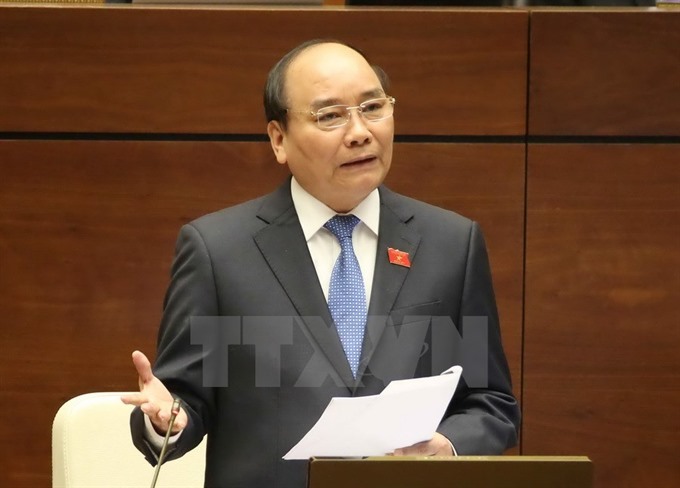 Politics & Law
Politics & Law

More than 30 National Assembly deputies raised questions to the Prime Minister Nguyễn Xuân Phúc, who was the last to appear at the NA's Question and Answer session yesterday, focusing on economic development, anti-corruption and climate change.
 |
| Prime Minister Nguyễn Xuân Phúc at the NA's Q&A session yesterday. — VNA/VNS Photo Phương Hoa |
HÀ NỘI — More than 30 National Assembly deputies raised questions to the Prime Minister Nguyễn Xuân Phúc, who was the last to appear at the NA’s Question and Answer session yesterday, focusing on economic development, anti-corruption and climate change.
The PM said that the Government is determined to ensure proactive governance marked by integrity as it deals with a host of problems and is making strong efforts to overcome shortcomings and difficulties faced by the economy.
Closing loopholes
Deputy Nguyễn Tiến Sinh of Hoà Bình Province raised questions about the management of investments in State-owned businesses, with a “loophole” causing "losses of hundreds of trillions of đồng".
“But we can’t find out who is responsible for the losses? What is the solution to this issue? And what are the measures being taken to fight corruption, which is getting more and more complicated?”
PM Phúc replied that there was a mechanism to manage the State-owned businesses for specific periods. Now, capital management agencies have been set up within State-owned enterprises to promote effective use of capital.
However, transparency and supervision of State-owned businesses would be enhanced, the PM said.
He also said he has suggested tougher provisions to plug loopholes in the anti-corruption law.
The “ask and offer” mechanism should be eliminated, the PM asserted.
Asset declarations of high-ranking officials and curbs on their power were other measures to prevent corruption, he said.
Deputy Lê Quân of Hà Nội wanted to know what measures were being taken to restructure weak banks and deal with bad debts.
PM Phúc said bad debts have caused great difficulties, but the Government has a comprehensive plan to resolve this and ensure a “safe economy”.
To deal with this tough issue, it is a must to build a better legal framework, especially for the operation of the Việt Nam Asset Management Company (VAMA), while tightening control to keep the debts within the limit.
At the same time, weak credit organisations that were purchased by the State Bank of Việt Nam at 0 đồng should be put under special inspection, he said.
The Government is working on comprehensive solutions to reduce bad debts and will report them to the parliament, the leader said.
Asked about the Government’s view on the settlement of loss-making projects over the past time, PM Phúc affirmed that the Government will not use taxes collected from the public to cover losses of the enterprises.
The Government will try to cut losses through selling those enterprises or allowing them to go bankrupt, he said, pledging to ensure the State’s interests during the settlement process and clarify the responsibility of related organisations and individuals.
PM Phúc also said the equitisation of State-owned enterprises will be accelerated on the condition of ensuring State asset and transparency in the process.
“Besides, the equitisation process is taking place under the supervision of shareholders. However, we will not carry out equitisation at any price. Some corporations and groups must be owned by the State,” he stressed.
Agriculture restructuring
Đà Nẵng Deputy Võ Thị Như Hoa wanted to know what measures were being taken to minimise climate change impacts on socio-economic development in the coming years, as also the solutions being considered in restructuring agricultural production.
The Prime Minister responded that the Government had a national action plan to limit the climate change impacts. It has also set aside funds for the plan, but all localities should actively participate in this effort, he said.
Agricultural restructuring was being dealt with as an urgent task because it involves the lives of millions of people, the PM said.
He said the restructuring would include expansion of co-operatives with the aim of increasing agricultural production and promoting the development of new rural areas.
This would involve trade promotions, product marketing and provision of preferential credit, the PM added.
During yesterday’s session, the PM also fielded questions about forestry policies, promotion of staff in Government agencies, use of public assets, tourism development, and education reform.
Law on Property Auction
The 14th National Assembly (NA) approved the Law on Property Auction yesterday.
The law, approved by 84.41 per cent of the NA deputies, stipulates the principles, process and procedures for property auctions, auction remuneration and expenses, violation settlement, auction result cancellation and damage compensation, and State management of property auctions.
The law goes into effect on July 1, 2017. However, a clause allowing auction organisers to collect service fees in accordance with existing legal regulations will take effect on January 1, 2017. — VNS




